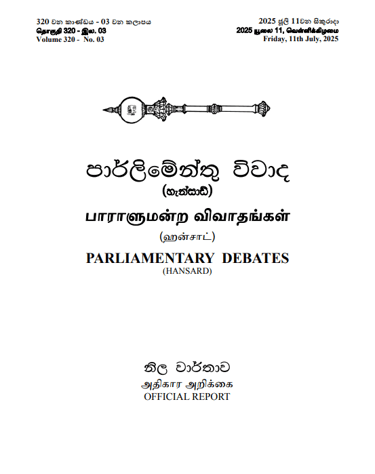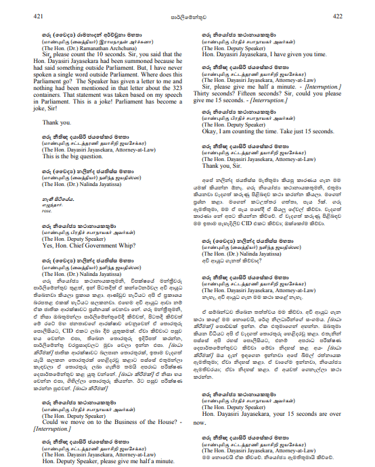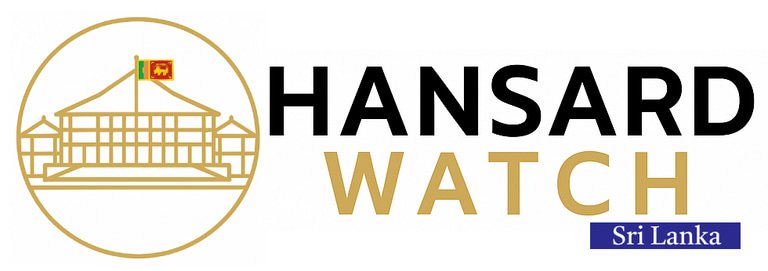Sign up to get early access to THE Artificial intelligence (AI) Hansard tool
What is the Hansard?
The Official Record of Parliament: The Hansard is the official, word-for-word report of everything said in Parliament. It is a permanent, public record of all debates, speeches, votes, and decisions. Think of it as the minutes of the nation's most important meeting.
Why it Matters
Your Window into Governance: The Hansard is the primary tool for holding elected officials accountable. It reveals what your MP says about important issues, tracks whether they fulfill their campaign promises, and provides a transparent record of how laws are made. By examining the Hansard, citizens can ensure their voices are truly represented.
History of the Sri Lanka Hansard
Overview
A Legacy of Accountability in Sri Lanka: The tradition of the Hansard in Sri Lanka dates back to the colonial era, adapted from the British parliamentary system. For over a century, it has served as the cornerstone of parliamentary procedure and a vital historical archive of our nation's political journey. The term Hansard refers to the verbatim transcript of proceedings in a legislature. In Sri Lanka, the record evolved from colonial‐era “Ceylon Hansards” of the 19th century into today’s fully digitised parliamentary debates. Throughout its 150-year journey the Hansard has safeguarded transparency, supported judicial review, and enabled citizens to hold their representatives to account.
Colonial Foundations (1833 – 1931)
Legislative Council created (1833). The Colebrooke-Cameron reforms introduced the first representative body, whose proceedings were published as The Debates of the Ceylon Legislative Council — the island’s earliest “Hansard” volumes.
First printed debats (1870s-1890s). Private printers such as A. M. & J. Ferguson issued bound annual records, e.g. the 1894-95 and 1897-98 sessions now preserved online.
McCallum Reforms (1910). Expansion of elected seats prompted regular publication of the Ceylon Hansard in a format closely modelled on the British original.
State Council Era (1931 – 1947)
Donoughmore Constitution. Universal adult franchise brought a unicameral State Council whose verbatim reports were styled Hansard of the State Council of Ceylon.
Technological progress. Shorthand writers were placed in the chamber; edited proofs were printed overnight for members and the press.
Parliamentary Hansard after Independence (1947 – present)
1947 – 1972: Parliament of Ceylon (House of Representatives & Senate)
The first Official Report (Hansard) of the inaugural independent Parliament was printed in 1948.1972 – 1978: National State Assembly
The publication title was amended to Debates – National State Assembly. Sinhala and Tamil reporting desks were introduced to reflect the new republican constitution.1978 – Today: Parliament of the Democratic Socialist Republic of Sri Lanka
Key developments during this period include:The Hansard Department was formally constituted under the Standing Orders.
Sinhala became the working draft language, with simultaneous English translation.
Digital composition was introduced in 1998, followed by public web access in 2001.
The Hansard Department
Mandate. The department “records, edits, translates and publishes verbatim reports of all sittings and committee meetings”.
Staffing. It is headed by an Editor of Hansard supported by Deputy Editors, Assistant Editors and a cadre of Hansard Reporters trained in real-time stenography.
Workflow today. Proceedings are captured on an electronic shorthand system, edited for accuracy without altering meaning, translated into Sinhala, Tamil and English, and uploaded to the parliamentary website within 24 hours for public download.
Digital Transformation and Open Access
Online archives (2001-). Corrected volumes from 1994 onwards are freely downloadable; daily “uncorrected hansards” are posted within hours of adjournment.
Third-party platforms. Civic tech sites such as Manthri.lk scrape Hansard PDFs to build searchable databases of MPs’ speeches, voting and attendance, enhancing accountability.
Parliamentary video-Hansard (2020-). Synchronized video and transcript streams (“Chamber-on-Demand”) allow viewers to click any line of debate and watch the exact moment in the chamber.
Why the Hansard Matters
Legal authority. Courts routinely consult Hansard to ascertain legislative intent; its admissibility was affirmed in landmark constitutional cases after 1978.
Historical record. From the 1860s coffee crisis to the 2009 war-end emergency sittings, the Hansard preserves primary sources for scholars and journalists.
Public trust. Ready access to what MPs actually say underlines the principle that “the people are entitled to know what is done in their name.”
Looking Ahead
Planned upgrades include real-time captions in all three languages, machine-readable XML versions for data analysis, and blockchain timestamping to guarantee authenticity — innovations that will keep the Sri Lanka Hansard at the heart of parliamentary transparency for the next century.




Hansard Watch
Transforming Sri Lanka parliamentary proceedings for public understanding with AI.
Contact us
STAY IN TOUCH
hello@hansardwatch.org
© 2025. All rights reserved.
